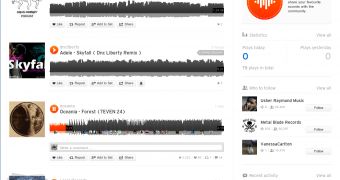SoundCloud has been working on a huge revamp of the site for the past few months. The new site is a lot more "app-like" and makes ample use of what HTML5 has to offer.
It's been available to users on beta for a while and it's now being rolled out to everyone, the Next SoundCloud becomes simply SoundCloud.
"Thanks to your feedback through months of private beta, we’re thrilled to be making a big announcement: today, the Next SoundCloud becomes SoundCloud for everyone," SoundCloud announced.
"What you hear and see today is the direct result of your input: this is your SoundCloud," it added.
"For creators of music & audio like you, it means that you’ll be heard everywhere. For your friends, fans and followers, the new SoundCloud will make discovering, connecting and sharing sounds even easier and more fun," it explained.
The visual revamp speaks for itself, the site looks and feels better. What's underneath is more important. There are some big changes to both the way SoundCloud works and to what it's supposed to be.
For one, there is now continuous playback, you can explore the site, find new artists or sound, check out your stream, all the while the music you choose plays in the background. The revamp was worth it for this change alone and it should definitely drive up engagement.
The second big change is the "repost" button which, much like the "retweet" button on Twitter, enables anyone to share music and sounds they find on SoundCloud with their followers.
This is a huge deal since it will enable a new breed of SoundCloud users to thrive, the curators. Currently, you're either a creator, i.e. you post new music or sounds, or you're a follower. Now, you don't have to make music to become popular on SoundCloud and influence people with your choices.
Also handy is the new concept of sets, basically a playlist of either your own sounds or the sounds from the site you find interesting.
This opens up to site to a whole new audience of both creators and followers. And it opens up opportunities for existing users as well, a record label could simply repost the tracks published on the artists' individual profiles, for example.

 14 DAY TRIAL //
14 DAY TRIAL //